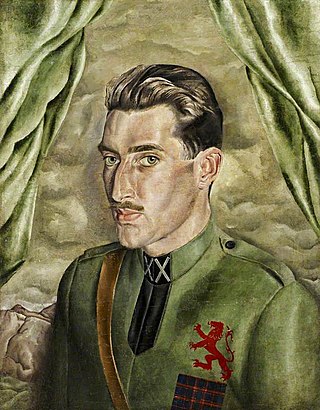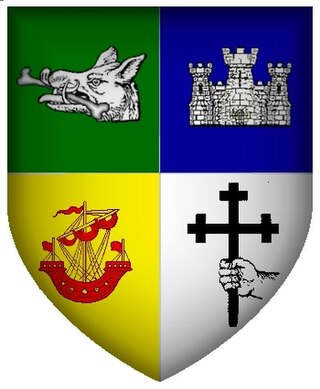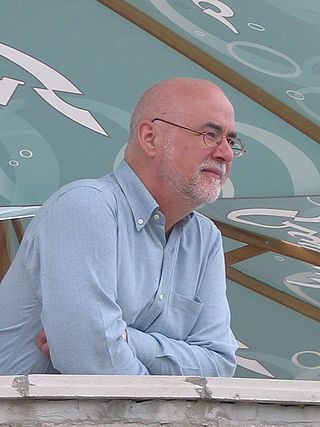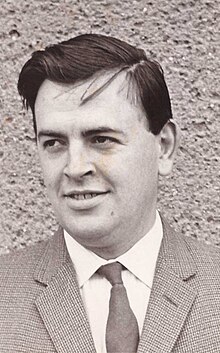
Sorley MacLean was a Scottish Gaelic poet, described by the Scottish Poetry Library as "one of the major Scottish poets of the modern era" because of his "mastery of his chosen medium and his engagement with the European poetic tradition and European politics". Nobel Prize Laureate Seamus Heaney credited MacLean with saving Scottish Gaelic poetry.

Norman Alexander MacCaig was a Scottish poet and teacher. His poetry, in modern English, is known for its humour, simplicity of language and great popularity.

Modern Scottish Poetry: An Anthology of the Scottish Renaissance 1920-1945 was a poetry anthology edited by Maurice Lindsay, and published in 1946 by Faber and Faber.
George Campbell Hay (1915–1984) was a Scottish Symbolist poet and translator, who wrote in Scottish Gaelic, Scots and English. He used the patronymic Deòrsa Mac Iain Dheòrsa. He also wrote poetry in French, Italian and Norwegian, and translated poetry from many languages into Gaelic.
The Scottish Renaissance was a mainly literary movement of the early to mid-20th century that can be seen as the Scottish version of modernism. It is sometimes referred to as the Scottish literary renaissance, although its influence went beyond literature into music, visual arts, and politics. The writers and artists of the Scottish Renaissance displayed a profound interest in both modern philosophy and technology, as well as incorporating folk influences, and a strong concern for the fate of Scotland's declining languages.
Sydney Goodsir Smith was a New Zealand-born Scottish poet, artist, dramatist and novelist. He wrote poetry in literary Scots, sometimes referred to as Lallans, and was a major figure of the Scottish Renaissance.
Robert Garioch Sutherland was a Scottish poet and translator. His poetry was written almost exclusively in the Scots language, he was a key member in the literary and language revival in the mid-20th century. However, his biggest influences were the 18th-century poet Robert Fergusson and the Italian Romanesco dialect sonneteer Giuseppe Gioachino Belli.
Chapman was a literary magazine based in Edinburgh, Scotland. It has published many Scottish and international authors, including Iain Crichton Smith, Alasdair Gray, Sorley MacLean and Kathleen Raine. It covered new poetry and short fiction, as well as critical essays and reviews.

Fionn Mac Colla was a Scottish novelist closely connected to the Scottish Gaelic language and culture who campaigned for it to return to what he perceived to be its rightful place in the Scottish mainstream. He was a good personal friend of Hugh MacDiarmid and Helen Cruickshank.

Clan MacKinnon is a Highland Scottish clan from the islands of Mull and Skye, in the Inner Hebrides.
The Scottish Gaelic Renaissance is a continuing movement concerning the revival of the Scottish Gaelic language and its literature. Although the Scottish Gaelic language had been facing gradual decline in the number of speakers since the late 19th century, the number of young and fluent Gaelic speakers is quickly rising. A similar trend is also taking place in the language revival of Canadian Gaelic in Nova Scotia, New Brunswick, and Prince Edward Island.

Christopher Whyte is a Scottish poet, novelist, translator and critic. He is a novelist in English, a poet in Scottish Gaelic, the translator into English of Marina Tsvetaeva, Pier Paolo Pasolini and Rainer Maria Rilke, and a critic of Scottish and international literature. His work in Gaelic appears under the name Crìsdean MacIlleBhàin.
Lines Review was a Scottish poetry journal founded by the publisher Callum Macdonald in 1952. Its original editorial board included the Scottish poets Sydney Goodsir Smith, Hugh MacDiarmid, Norman MacCaig, Sorley MacLean and Denis Peploe. Latterly its individual editors included the poets Robin Fulton and Tessa Ransford. Tessa Ransford, the founder of the Scottish Poetry Library, published the final issue in 1998.
Callum Macdonald MBE (1912–1999), was a Scottish printer and publisher born in Breaclete on the island of Great Bernera. He was educated in Stornoway and read History at the University of Edinburgh. After service in the Royal Air Force in World War II, he set up in business as a publisher in Edinburgh and founded the literary journal Lines Review in 1952. He died in Peebles.
Ian Burgham is a poet. He is the son of Lt. Cmdr. Allen Russell Burgham, DSC,MiD,CD. and Jean Wallace. He has lived in New Zealand and Scotland, but currently resides in Canada. He spent his formative years in Kingston, Ontario and graduated from Queen's Universityin 1972. While at Queen's he studied poetry and poetic process with Professor George Whalley, poet, writer and well-known Coleridge scholar. In 1973, Burgham moved to New Zealand where he taught at Wellington College. In 1975 he moved to Scotland to attend Edinburgh University, taking an M. Litt. degree in Blake studies. His thesis, written under the supervision of Professor Michael Phillips, focussed on William Blake's theory of imagination and the origins of Blake's poetry and theories.
Scottish Gaelic literature refers to literary works composed in the Scottish Gaelic language, which is, like Irish and Manx, a member of the Goidelic branch of Celtic languages. Gaelic literature was also composed in Gàidhealtachd communities throughout the global Scottish diaspora where the language has been and is still spoken.
Mary MacPherson (née MacDonald), known as Màiri Mhòr nan Òran or simply Màiri Mhòr, was a Scottish Gaelic poet from the Isle of Skye, whose contribution to Scottish Gaelic literature is focused heavily upon the Highland Clearances and the Crofters War; the Highland Land League's campaigns of rent strikes and other forms of direct action. Although she could read her own work when it was written down, she could not write it down herself. She retained her songs and poems in her memory and eventually dictated them to others, who wrote them down for publication. She often referred to herself as Màiri Nighean Iain Bhàin, the name by which she would have been known in the Skye of her childhood.

Dàin do Eimhir is a sequence of sixty poems written in Scottish Gaelic by Sorley MacLean. Considered MacLean's masterpiece, the poems deal with intertwining themes of romantic love, landscape, history, and the Spanish Civil War, and are among the most important works ever written in Scottish Gaelic literature.







